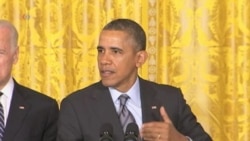WHITE HOUSE —
President Barack Obama met with top American CEOs at the White House Friday to discuss commitments their companies have made to help the long-term unemployed find jobs. The White House says 300 companies have agreed to do their part.
In his State of the Union Address, the president spoke of the need to help the long-term unemployed get what he called a "fair shot" at finding a job. "Tonight, I ask every business leader in America to join us and do the same because we are stronger when America fields a full team," he said.
On Friday, Obama met with CEOs from some of the 300 companies -- including McDonald's, Boeing and Bank of America -- the White House says are committing to "best practices" for hiring. In other words, they've agreed to revamp their hiring practices to make sure those out of work for long periods get a fair shot at a job.
The long-term unemployed have been out of work for 27 weeks or more. The government says they currently number 3.9 million.
That's nearly 40 percent of all unemployed Americans.
Erick Varela, a former combat infantryman who introduced Obama at a related White House event Friday, described the experience of prolonged joblessness. "With no luck, I was motivated to work and I wanted to work and I knew I could contribute to society, like I had in my military service. But I felt helpless, lost and more importantly, a disappointment and a failure to my family," he said.
Varela was re-trained and now has a job.
Obama called that a success story, but one that also demonstrates the challenge. "Folks who have been unemployed the longest often have the toughest time getting back to work. It’s a cruel Catch-22 [paradox] -- the longer you’re unemployed, the more unemployable you may seem. Now, this is an illusion, but it’s one that unfortunately we know statistically is happening out there."
The pledges by the CEOs are a downpayment on future progress, said Secretary of Labor Tom Perez.
"When you're talking about Fortune 100 companies, you're talking about force multipliers. And when you are talking about force multipliers, you're talking about helping thousands of people," said Perez.
Obama signed an order to ensure that government agencies consider long-term unemployment when making hiring decisions. He criticized Congress for allowing unemployment benefits for the long term unemployed to lapse.
"Each week that Congress fails to restore that insurance, roughly 72,000 Americans will join the ranks of the long-term unemployed who have also lost their economic lifeline," said the president.
Republicans in Congress have argued that extended benefits create a disincentive for people to find work.
The White House is not saying how many unemployed Americans might benefit from Obama's outreach to companies, but he hopes it brings many more on board.
In his State of the Union Address, the president spoke of the need to help the long-term unemployed get what he called a "fair shot" at finding a job. "Tonight, I ask every business leader in America to join us and do the same because we are stronger when America fields a full team," he said.
On Friday, Obama met with CEOs from some of the 300 companies -- including McDonald's, Boeing and Bank of America -- the White House says are committing to "best practices" for hiring. In other words, they've agreed to revamp their hiring practices to make sure those out of work for long periods get a fair shot at a job.
The long-term unemployed have been out of work for 27 weeks or more. The government says they currently number 3.9 million.
That's nearly 40 percent of all unemployed Americans.
Erick Varela, a former combat infantryman who introduced Obama at a related White House event Friday, described the experience of prolonged joblessness. "With no luck, I was motivated to work and I wanted to work and I knew I could contribute to society, like I had in my military service. But I felt helpless, lost and more importantly, a disappointment and a failure to my family," he said.
Varela was re-trained and now has a job.
Obama called that a success story, but one that also demonstrates the challenge. "Folks who have been unemployed the longest often have the toughest time getting back to work. It’s a cruel Catch-22 [paradox] -- the longer you’re unemployed, the more unemployable you may seem. Now, this is an illusion, but it’s one that unfortunately we know statistically is happening out there."
The pledges by the CEOs are a downpayment on future progress, said Secretary of Labor Tom Perez.
"When you're talking about Fortune 100 companies, you're talking about force multipliers. And when you are talking about force multipliers, you're talking about helping thousands of people," said Perez.
Obama signed an order to ensure that government agencies consider long-term unemployment when making hiring decisions. He criticized Congress for allowing unemployment benefits for the long term unemployed to lapse.
"Each week that Congress fails to restore that insurance, roughly 72,000 Americans will join the ranks of the long-term unemployed who have also lost their economic lifeline," said the president.
Republicans in Congress have argued that extended benefits create a disincentive for people to find work.
The White House is not saying how many unemployed Americans might benefit from Obama's outreach to companies, but he hopes it brings many more on board.






